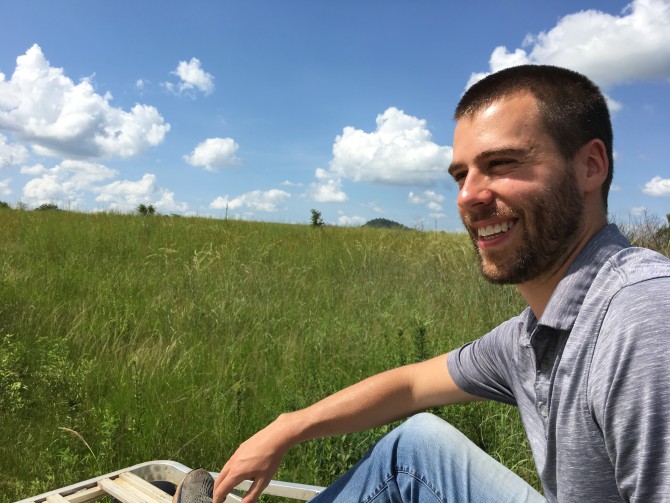At the height of the pandemic in 2020, Paul Friesen met by Zoom with four fellow University of Notre Dame graduate students to talk about the upcoming U.S. election. They were all studying international politics. After four years of observing the behavior of former President Donald J. Trump, they felt the need to go on the record: American democracy was in peril.
It wasn’t just a hunch. They had studied dozens of countries where democratic institutions were attacked and the legitimacy of elections questioned.
“We found that we were much more worried than a lot of the American politics students and professors,” Friesen recalled. “So based on input from both American and world politics professors, we initiated a project to provide warning signs and possible recommendations about the different bad things that could happen.”
At the time, Friesen was doing doctoral research on elections and partisanship in southern Africa. He had studied the rise of populism and the political importance of identity. He knew that democracies are weakened by extreme political polarization. He understood the appeal of strongman leaders during periods of economic and technological change. He was aware that autocrats are typically elected by popular vote, then use a variety of tactics to undermine institutions and consolidate power.
Adding it all up, he and his colleagues could easily imagine where the United States might be headed.
Four years and one general election cycle later, Friesen is using his international lens to monitor threats to democracy in the United States and around the world as democratic threats and resilience postdoctoral fellow at the Mario Einaudi Center for International Studies.
Friesen and the democratic threats team published an article this month on democratic backsliding worldwide. “I’ve always thought that the comparative politics perspective is just so important for understanding American politics,” he said.
When Trump was in office, Friesen said, he tried many of the tools used by autocrats elsewhere. He worked to deepen the partisan divide, labeling Democrats traitors to the nation. He sought to erode public confidence in institutions ranging from public education and voting systems to the FBI and the courts.
He called migrants “invaders” and journalists “enemies of the people.” He threatened to involve the military in suppressing civil unrest. And when he lost his bid for reelection, he refused to accept the result. But Trump’s efforts were haphazard, and his first term ended with state institutions battered but intact.
In countries with strong democratic institutions, Friesen said, the shift toward autocracy generally takes place over the course of many years, and much of it happens within accepted political processes.
“Successfully consolidating power takes careful preparation,” he said. “It takes a handful of powerful people who are coordinating to get it done, like rigging an election or sabotaging a democratic institution. So they have to plan early for it. We’re lucky that Trump didn’t plan ahead.”
Now the former president – likely the 2024 Republican nominee – and his allies have had four years to learn from their past missteps and study how leaders like Hungary’s Victor Orban, Russia’s Vladimir Putin or Turkey’s Recep Tayyip Erdoğan have accumulated power.
Thinking internationally comes naturally to Friesen. He is originally from Michigan, but he spent his middle and high school years in Thailand with his family.
Friesen’s work took him to Zimbabwe after college graduation, where he became interested in the country’s life and politics.
“That gave me an enduring interest in other cultures and issues of global justice and poverty,” he said. When he was in college, he thought he would go on to work in international development. That goal took him to Zimbabwe soon after he graduated. The experience was transformative.
“I found everything about life there – especially politics – totally fascinating,” he recalled. “Not only was the political landscape different from ours, but I could see how autocracy and a legacy of violence were hindering the well-being of regular people.”
He would come to learn first-hand how citizens’ direct experiences with government affect their attitudes toward democracy and how authoritarian leaders find support where ordinary people feel unheard or left behind.
“In autocracies and democracies alike, I think it starts with a feeling of powerless, feeling like nobody hears you or cares about what you think,” Friesen said. “It’s feeling disconnected. It’s not having meaningful, regular opportunities to be part of a decision-making process.”
Political scientists often prescribe high-level policy solutions to shore up democratic institutions – term limits, electoral reforms, campaign finance reforms and so on. Friesen endorses these efforts, but thinks we should pay more attention to strengthening local governments and civil society organizations and “building people’s sense that their voices count.”
There may be lessons to be learned from countries that seem like prime examples of what to avoid. In many African countries with both democratic and autocratic-leaning national governments, he says, robust traditions of deliberative democracy built into community life offer some leads for the deadlock of current American politics.
When there’s a problem, the local community leader will hold a town meeting where people freely discuss the options and make collective decisions. When citizens have a say in issues that affect them directly, Friesen said, they may be less inclined to vote for a populist strongman.
Jonathan Miller is a freelance writer for Global Cornell.









